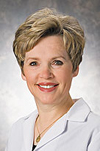Acne is most often induced by hormonal changes. Oil trapped in the sebaceous glands form plugs in the pores of the skin, causing whiteheads. If the pore remains open, the top surface of the plug becomes dark, causing a blackhead. Bacteria thrive in this environment, causing pimples.
Left untreated, acne scarring can occur. When tissues are injured, the body rushes to repair the injury site. Among the elements of the repair are white blood cells and inflammatory molecules that have the task of repairing tissue and fighting infection. When their job is done they may remain at the site of an active acne lesion for days or even weeks. In people who are susceptible to scarring, the result may be an acne scar in the form of fibrous or eroded tissue. Two types of scars exist: depressed areas and raised thickened tissue such as keloids.
Acne Treatment
Most over-the-counter topical treatments are for mild acne. When used according to directions, these topicals can be an effective treatment. The treatments described below are for moderate to advanced acne and for those not responding to conventional treatment. The best treatment will be prescribed by your Trillium Creek Dermatology Medical Professional.
- Oral Hormones/Birth Control Pills: Can be a very effective treatment for acne in women when hormonal imbalance is the cause. There is a wide range of formulations representing different combinations of estrogen and progestin. Your Trillium Creek Medical Professional will work with you to find the right combination to reduce the frequency and severity of your acne outbreaks.
- Oral Antibiotics & Vitamins: Antibiotics are effective in reducing bacteria and fighting inflammation for moderate to severe cases. They include tetracycline, doxycycline and minocycline. Certain vitamins can also play a key role in fighting acne. Vitamin A, Vitamin E, Zinc, Selenium and Magnesium have all shown to prevent or minimize acne outbreaks. Because some vitamins can be harmful in large doses, your Trillium Creek Medical Professional will advise you on the safest, most effective amounts to take for acne relief.
- Topical Therapy: Effective treatments available both over-the-counter and by prescription only. Over-the-counter topical treatments include benzoyl peroxide, a mild antibiotic available in various concentrations; sulfur-based products, effective in treating existing blackheads and whiteheads; and salicylic acid, also effective in treating existing blackheads and whiteheads. Prescription topical treatments include retinoids, a common, effective treatment used to unclog swollen pores and maintain clear skin; prescription antibiotics such as erythromycin and clindamycin used to kill the bacteria that leads to inflammation; and sulfacetamide, an antibiotic often combined with sulfur, that opens clogged pores and is effective in treating inflammatory acne.
- Isotretinoin (Accutane): One of the best-known pharmaceuticals for acne. Isotretinoin is very similar to vitamin A and shrinks the sebaceous gland. It halts the production of the natural oil that causes acne. The side effects associated with this and related products require the patient to follow detailed guidelines.
- Blu-U® (Blue Invisible Light Spectrum): Utilizes blue light wavelengths to kill the bacteria in your skin that is responsible for acne. Non-invasive and pain-free, patients generally undergo treatment 2 times a week for up to 6 weeks. Blu-U® combats acne in three ways: it inactivates bacteria, shuts down sebaceous glands and unclogs pores by exfoliating the skin. An additional benefit is to smooth the appearance of acne scarring.
- Aminolevulinic Acid (ALA): A photosensitizing agent that may be applied as a pretreatment to Blu-U® for severe acne, particularly if excessive oil is a major contributing factor. ALA also helps improve acne scarring.
- Intense Pulsed Light (IPL): Utilizes controlled pulses of light applied to the affected area to destroy bacteria-causing acne. The patient continues to see results even after the treatment. IPL shrinks oil glands, pores and broken blood vessels. ALA can be added for long lasting results.
- Ultra Sound Microdermabrasion: A gentle "skin-polishing" system that provides gradual results in clearing acne. It helps to break down oils and clean the skin. With regular treatments, mild acne can be successfully treated.
RESULTS
Acne left untreated can cause scarring and make individuals insecure and introverted. In a recent study, acne sufferers were shown to cover their faces, walk with their heads down and generally have guilty feelings. After treatment, the group regained their self-confidence and felt more comfortable in social situations. Treating acne and acne scarring is beneficial for the mind, body and spirit.
